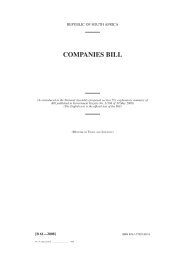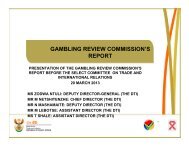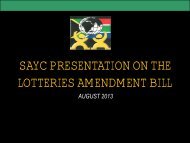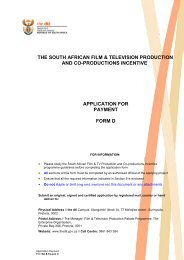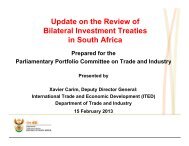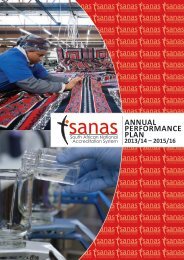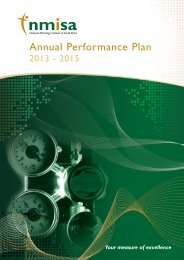Copyright Review Commission Report - ICT Law and Regulation ...
Copyright Review Commission Report - ICT Law and Regulation ...
Copyright Review Commission Report - ICT Law and Regulation ...
- No tags were found...
Create successful ePaper yourself
Turn your PDF publications into a flip-book with our unique Google optimized e-Paper software.
10.4.4. Most of the other collecting societies do not retain any cash for investments; 100% of the collections receivedare paid out to members. The non-royalty income relates to the interest earned on cash-on-h<strong>and</strong> (i.e. waiting fordistribution).10.4.5. SAMPRA’s non-royalty income (generated by the cash-on-call accounts) constitutes 9% of the total collections.The higher income is a result of cumulative undistributed cash, which has been collected over the last threeyears.10.5 RECIPROCAL AGREEMENTS10.5.1. SAMPRA grants licences in respect of repertoire owned by members of RiSA, whereas NORM grants licencesin respect of repertoire owned by its members.10.5.2. SAMRO <strong>and</strong> DALRO are affiliated to numerous similar organisations around the world. They have a number ofreciprocal agreements in terms of which these societies administer the music of SAMRO’s members in theircountries, having been authorised to do so by licences or assignments of copyright effective in the countries inwhich they operate. SAMRO, in turn, is authorised to administer the repertoire of these societies in South Africa.These societies apply the principle of national treatment in accounting for royalties, with the result that the termson which SAMRO <strong>and</strong> DALRO collect <strong>and</strong> account to foreign affiliates are the same as those upon which theycollect on behalf of South African composers <strong>and</strong> publishers. SAMRO acts as an assignee of the rights of itsmembers <strong>and</strong> is the owner of the rights it administers. However, upon resigning from SAMRO, each member isentitled to the re-assignment of his or her rights.10.5.3. DALRO acts differently. It administers on behalf of its principals, who retain ownership of the rights. No rightsare alienated to third parties without the consent of the owner of the rights. DALRO does not have authority toadminister Section 6 rights on behalf of all authors.10.5.4. There are no reciprocal agreements in the copyright regime between states; a state such as South Africacannot direct how reciprocal agreements should be structured in terms of Section 4 of the Performers’Protection Act.10.5.5. Globally, the majority of collecting societies have ‘blanket agreements’ with broadcasters, while others operateas if ‘blanket agreements’ exist. In countries where there are multiple collecting societies for each right, such asBrazil <strong>and</strong> France, single collecting agents are responsible for collecting royalties from the users on behalf ofthese multiple societies. In almost all cases, the broadcasters pay the royalty liability to the collecting societiesor agents. The responsibility for locating the relevant beneficiaries rests with the collecting societies or agents. Ifa song written, composed <strong>and</strong> published in South Africa is played in another country where no reciprocalagreements exist, the royalties pertaining to that song are paid by the broadcaster in question together with allother royalties to the relevant foreign collecting society. As part of the process of identifying the recipients ornon-members, the relevant country <strong>and</strong> collecting society will be identified <strong>and</strong> the money will be forwarded tothat society. It will be the responsibility of the local collecting society to identify the relevant beneficiaries(author, composer <strong>and</strong> publisher). The fact that there are no reciprocal agreements <strong>and</strong> that they are notmembers of any collecting society does not take away their rights to be compensated, provided the countriesinvolved are signatories to the Berne Convention. The importance of the reciprocal agreements is to regulate- 74 -





